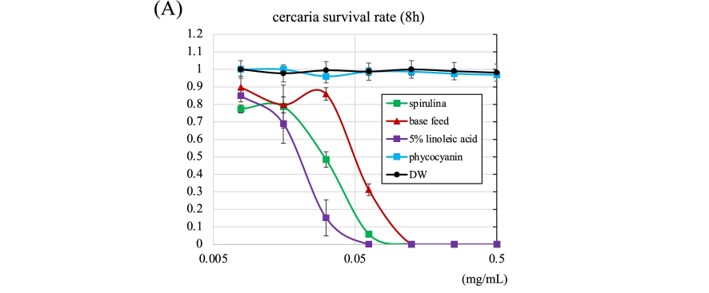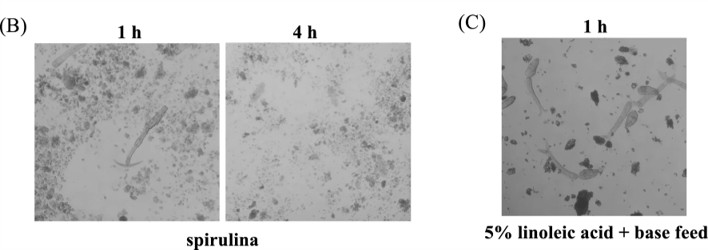Discovering a New Spirulina-Based Environment-Friendly, Sustainable
Strategy for Suppressing Parasitic Infection
—DIC publishes a joint paper with the Institute of Science Tokyo, Nippon Bunri University and Kyorin on a new application for Spirulina in the suppression of schistosomiasis—
- Sustainability
- News Release
Tokyo, Japan—DIC Corporation announced today that it has published a joint paper with the Institute of Science Tokyo, Nippon Bunri University and Kyorin Co., Ltd., on research into a new application for Spirulina in curbing schistosomiasis* in the April 2, 2025, issue of Tropical Medicine and Health, the official journal of the Japanese Society of Tropical Medicine. The paper details the researchers’ discovery of an environment-friendly, sustainable approach to suppressing parasitic infection by administering Spirulina to intermediate host† freshwater snails, reducing the number of schistosome flatworm larvae released without killing the molluscs
<Background>
Schistosomiasis is a neglected tropical disease (NTD)‡ that affects 250 million people worldwide, primarily in Africa, Central and South America, and Southeast Asia. The disease is spread when schistosome larvae (cercariae§) present in bodies of fresh water invade humans via percutaneous infection, mature in the blood vessels and lay eggs. Efforts to rein in infection currently rely mainly on the use of a molluscicide to kill intermediate host snails, the source of transmission. While this method is highly effective, it also poses a significant environmental threat.
<Research findings>
■ With the goal of realizing a new strategy for curbing schistosomiasis, researchers developed a new Spirulina snail feed that is non-toxic to the environment. Research confirmed the effectiveness of this feed in reducing cercariae growth and development within intermediate host snails.
■ Research also confirmed that the direct administration of this Spirulina feed to infected snails kills cercariae, and that it acts selectively on the cercariae and thus does not impact snail survival.
■ With environmental toxicity discouraging the broad deployment of existing molluscicides, Spirulina feed offers promise as a safe and sustainable alternative that acts only on the parasite. Going forward, plans include conducting field trials and exploring its application in helping to curb other parasitic diseases.
These research findings underscore the potential for deploying Spirulina, a highly sustainable material, in the fight to eliminate schistosomiasis as a public health problem. These new technologies have been patented.
<About DIC Spirulina>
The DIC Group has been engaged in the cultivation of Spirulina, an edible blue-green algae containing more than 50 healthy nutrients, since the 1970s, and was the first commercial producer to succeed in outdoor Spirulina cultivation. As a pioneer in algae research, the Group has expanded its Spirulina-based products to include health foods, food colorings, food ingredients and livestock feed.
In its DIC Vision 2030 long-term management plan, the DIC Group identifies healthcare as a priority business area that will position it to contribute to the realization of a quality of life–oriented society. Accordingly, the Group is working to expand its presence in this area. Against a backdrop of increasing health consciousness on the part of consumers, the Group will continue to promote the development of food products and supplements with a focus on food safety and food security.
† An intermediate host is an organism that harbors a sexually immature parasite. The intermediate host is required by the parasite in order to develop and metamorphose, and acts as a vector to transmit the parasite to its primary, or definitive, host, where it matures and reproduces sexually. The intermediate hosts for schistosomes are freshwater snails.
‡ NTDs are a group of 21 parasitic and bacterial infectious diseases defined by the World Health Organization that disproportionately affect the poor in tropical areas. Approximately 1.6 billion people worldwide are at risk of infection, with contributing factors including inadequate sanitation and other issues stemming from poverty. The spread of such diseases can limit the labor supply and lower productivity, impeding the ability of such areas to escape poverty.
§ A schistosome cercaria is the larval form of the parasite that is released into water from an intermediate host snail, where it invades humans via percutaneous infection.
<Research highlights>
Snails were infected with Schistosoma mansoni and given Spirulina feed. A significant reduction in the release of cercariae was discovered, demonstrating the effectiveness of Spirulina in this application.
<Publication details>
Journal: Tropical Medicine and Health
Title of paper: “Development of a spirulina feed effective only for the two larval stages of Schistosoma mansoni, not the intermediate host mollusc”
URL:https://tropmedhealth.biomedcentral.com/articles/10.1186/s41182-025-00727-3
– Ends –
DIC Corporation is one of the world’s leading fine chemicals companies and the core of the DIC Group, a multinational organization comprising around 170 companies, including Sun Chemical Corporation, in more than 60 countries and territories. The DIC Group is recognized as a global leader in the markets for a variety of products essential to modern lifestyles, notably packaging materials, display materials such as those used in television and computer displays, and high-performance materials for smartphones and other digital devices, as well as for automobiles. Through such products, the Group endeavors to deliver safety and peace of mind, and color and comfort, to people everywhere. The DIC Group also seeks to contribute to a sustainable society by developing innovative products that respond to social change and which help address social imperatives. With annual consolidated net sales exceeding ¥1 trillion and 21,000-plus employees worldwide, the Group pledges to continue working in close cooperation with its customers wherever they are.
For more information, please visit the DIC global website: https://www.dic-global.com




